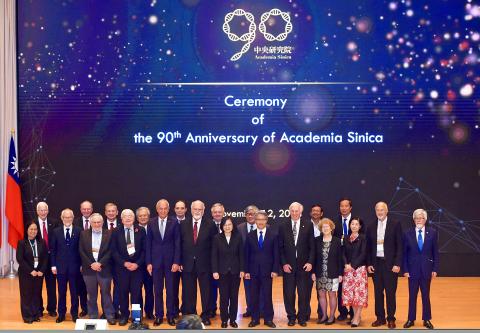Increasing “fake news” and declining trust in science are challenging academia, US National Academy of Sciences foreign secretary John Hildebrand told a gathering at Academia Sinica in Taipei yesterday, where he called on researchers to avoid bias and political actions.
Twenty academics from 15 countries attended the International Scientific Leaders’ Forum held by Taiwan’s highest academic research institution as part of its 90th anniversary celebrations on its campus in Taipei’s Nangang District (南港).
In his keynote speech, titled The Origins and Roles of Academies, Hildebrand said that contemporary populist movements see science as part of an elite order, which leads to politicization of science, decline of trust in scientists, and the spread of fake news and “alternative facts.”

Photo: Huang Yao-cheng, Taipei Times
To address these challenges, researchers should step up interaction with the public and improve general science literacy, while avoiding overt political actions and biased speeches, he said.
Okinawa Institute of Science and Technology president Peter Gruss, a researcher in gene regulation and embryonic development, gave a speech titled Can We Survive Without Science?
He said that more technological innovations are needed, as the world would be facing great transitions over the next three decades.
For example, artificial intelligence (AI)-assisted diagnostics and precision medicine could trigger a shift from therapy to prediction and prevention of diseases, he said.
Taiwan has a unique opportunity to boost its healthcare system by developing AI technologies, especially as National Health Insurance Administration data provide researchers with a wealth of information, Gruss said, adding that his institute is keen to collaborate with Taiwan.
Taiwan devotes less public funding to its basic research than South Korea, Singapore and Malaysia, Gruss said, adding that the government should allocate more funding to basic research to create momentum for technological progress.
Academia Sinica President James Liao (廖俊智) said that researchers should move forward with ambition, responsibility and wisdom, and become leaders in their research domains.
Identifying major problems facing the world, Liao said researchers should propose new solutions to control climate change, use energy and fix carbon without affecting the environment, and achieve healthy longevity in aging societies.
Areas such as AI, memory and consciousness, psychological stress alleviation, connection between past and present, and prediction of events are also worth exploring, Liao said.
Also speaking at the forum, President Tsai Ing-wen (蔡英文) said that the government would continue to support basic research.
She said she hoped that the National Biotech Research Park inaugurated in Nangang last month would attract innovators from around the world.

Chinese Nationalist Party (KMT) Chairman Eric Chu (朱立倫), spokeswoman Yang Chih-yu (楊智伃) and Legislator Hsieh Lung-chieh (謝龍介) would be summoned by police for questioning for leading an illegal assembly on Thursday evening last week, Minister of the Interior Liu Shyh-fang (劉世芳) said today. The three KMT officials led an assembly outside the Taipei City Prosecutors’ Office, a restricted area where public assembly is not allowed, protesting the questioning of several KMT staff and searches of KMT headquarters and offices in a recall petition forgery case. Chu, Yang and Hsieh are all suspected of contravening the Assembly and Parade Act (集會遊行法) by holding

PRAISE: Japanese visitor Takashi Kubota said the Taiwanese temple architecture images showcased in the AI Art Gallery were the most impressive displays he saw Taiwan does not have an official pavilion at the World Expo in Osaka, Japan, because of its diplomatic predicament, but the government-backed Tech World pavilion is drawing interest with its unique recreations of works by Taiwanese artists. The pavilion features an artificial intelligence (AI)-based art gallery showcasing works of famous Taiwanese artists from the Japanese colonial period using innovative technologies. Among its main simulated displays are Eastern gouache paintings by Chen Chin (陳進), Lin Yu-shan (林玉山) and Kuo Hsueh-hu (郭雪湖), who were the three young Taiwanese painters selected for the East Asian Painting exhibition in 1927. Gouache is a water-based

Taiwan would welcome the return of Honduras as a diplomatic ally if its next president decides to make such a move, Minister of Foreign Affairs Lin Chia-lung (林佳龍) said yesterday. “Of course, we would welcome Honduras if they want to restore diplomatic ties with Taiwan after their elections,” Lin said at a meeting of the legislature’s Foreign Affairs and National Defense Committee, when asked to comment on statements made by two of the three Honduran presidential candidates during the presidential campaign in the Central American country. Taiwan is paying close attention to the region as a whole in the wake of a

OFF-TARGET: More than 30,000 participants were expected to take part in the Games next month, but only 6,550 foreign and 19,400 Taiwanese athletes have registered Taipei city councilors yesterday blasted the organizers of next month’s World Masters Games over sudden timetable and venue changes, which they said have caused thousands of participants to back out of the international sporting event, among other organizational issues. They also cited visa delays and political interference by China as reasons many foreign athletes are requesting refunds for the event, to be held from May 17 to 30. Jointly organized by the Taipei and New Taipei City governments, the games have been rocked by numerous controversies since preparations began in 2020. Taipei City Councilor Lin Yen-feng (林延鳳) said yesterday that new measures by